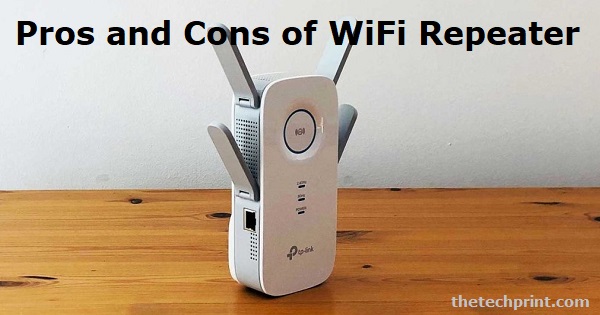Although wireless networking is a popular alternative to traditional wired networking, it allows many computers to communicate and share an Internet connection without needing physical connections. On the other hand, wireless networking has several drawbacks, such as signal strength degradation. A wireless repeater (range extender) is a device that collects signals from routers and transmits them again over a wireless network. If you're shopping for something for your home, be aware of the pros and cons of WiFi repeater.
Let's start with the pros of WiFi repeaters and how they can be of use to you:
One of the most significant advantages of wireless extenders is that they don't require wires. This means you can easily add them to your existing network without running any new cables.
Usually, it would be costly to run Ethernet cables everywhere if you have a large home or office. With a WiFi repeater, you can simply plug it into an outlet and extend your existing wireless network.
One of the notable pros of WiFi repeater is that it’s very easy to install. You don't need to hire a professional or run any cables. Simply find a good location for the repeater and plug it in.
The main advantage of utilizing a wireless repeater is that it can boost wireless signal strength without requiring you to move a computer or router. The farther apart a computer and wireless router are, the weaker the connection will be. Insufficient signals might cause slow or intermittent connectivity. A wireless repeater midway between a computer and the router it connects to may improve performance on the Internet by providing a stronger signal.
Since WiFi repeaters receive signals from an existing router and transmit them, this effectively extends your current wireless network. This is very beneficial if you have a large home or office.
One of the best things about WiFi repeaters is that they can support multiple devices. This means you can connect more than one computer or device to the Internet without problems.
Now let's take a look at some of the potential cons of WiFi repeater:
One of the main problems with WiFi repeaters is that they can cause signal interference. If there are too many devices on the same network, this can lead to slower speeds and connectivity issues.
Another potential disadvantage of WiFi repeaters is that they may not be able to penetrate physical barriers such as walls. This means you need to know where to place the repeater to get the best possible signal.
The most significant limitation of WiFi repeaters is their limited range. If you have a large home or office, you may need to purchase more than one repeater to cover the entire area.
One of the things to remember is that WiFi repeaters can create security issues. Be sure to consult a professional before setting up a WiFi repeater to ensure it is properly configured. If the repeater is not configured correctly, it could allow unauthorized users access to your network.
One of the prominent cons of WiFi repeater is that the Internet connection might be slower than if the computer were connected directly to the router with an Ethernet cable. A single user downloading large files or streaming video might benefit from a wired connection.
However, when multiple users share the same wireless connection, the overall speed might be reduced due to limited bandwidth. If you experience slow speeds when using a wireless repeater, try connecting the computer directly to the router with an Ethernet cable to see if that improves performance.
Final Thoughts: Pros and Cons of WiFi Repeater
All in all, there are both pros and cons of WiFi repeater. It's essential to weigh these factors carefully before deciding whether or not a WiFi repeater is suitable for you. A WiFi repeater might be a good option if you need to extend your wireless network and don't mind the potential disadvantages. However, if you're looking for the fastest possible speeds and don't mind running Ethernet cables, then connecting your computer directly to the router might be the better choice.

Repeaters can't segment a network. It's unable to produce distinct traffic from one cable to another. The Repeaters are ineffective at separating the gadgets since all data is passed on to numerous domains. Furthermore, repeaters are powerless in determining if it's a neighborhood of the same collision domain.
A WiFi repeater is often assumed to be a quick and inexpensive way to expand your wireless network's coverage. However, the fact is that a repeater rarely solves the problem and is thus a waste of money.
A WiFi repeater links to a router and wireless devices simultaneously. The farther away the WiFi repeater is from the router, the weaker the signal will be. This means that your wireless gadgets will only receive half of the bandwidth available. Reduced bandwidth reduces connection speeds.
If your router and repeater are too far apart or there is a barrier, you should utilize a WiFi repeater. You should use a WiFi extender if you need the same solid and reliable connection from your router.